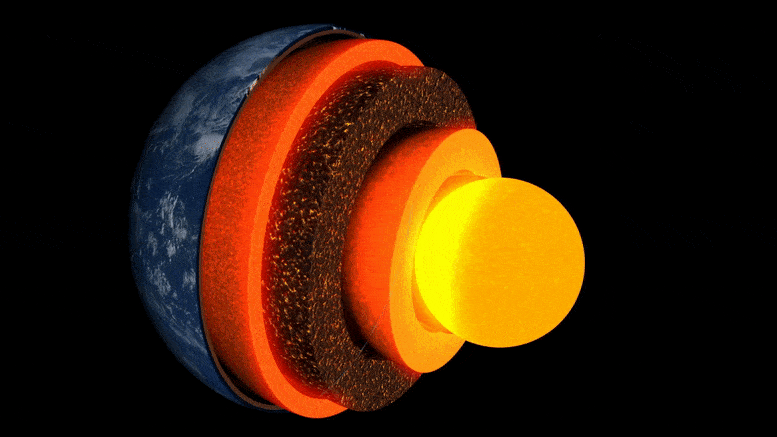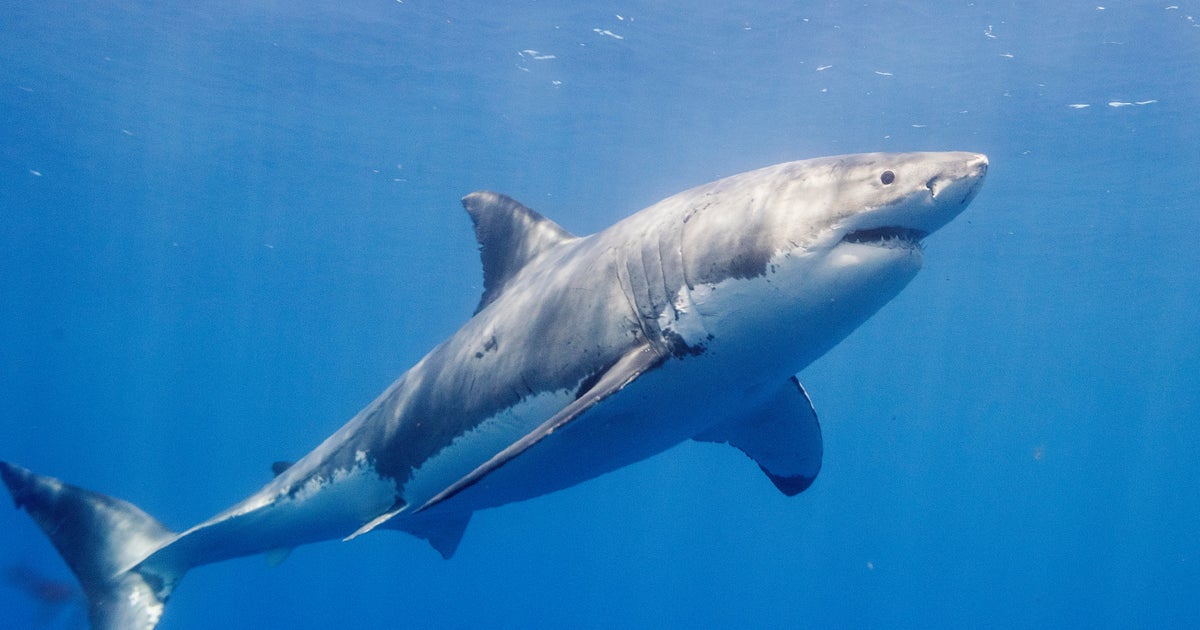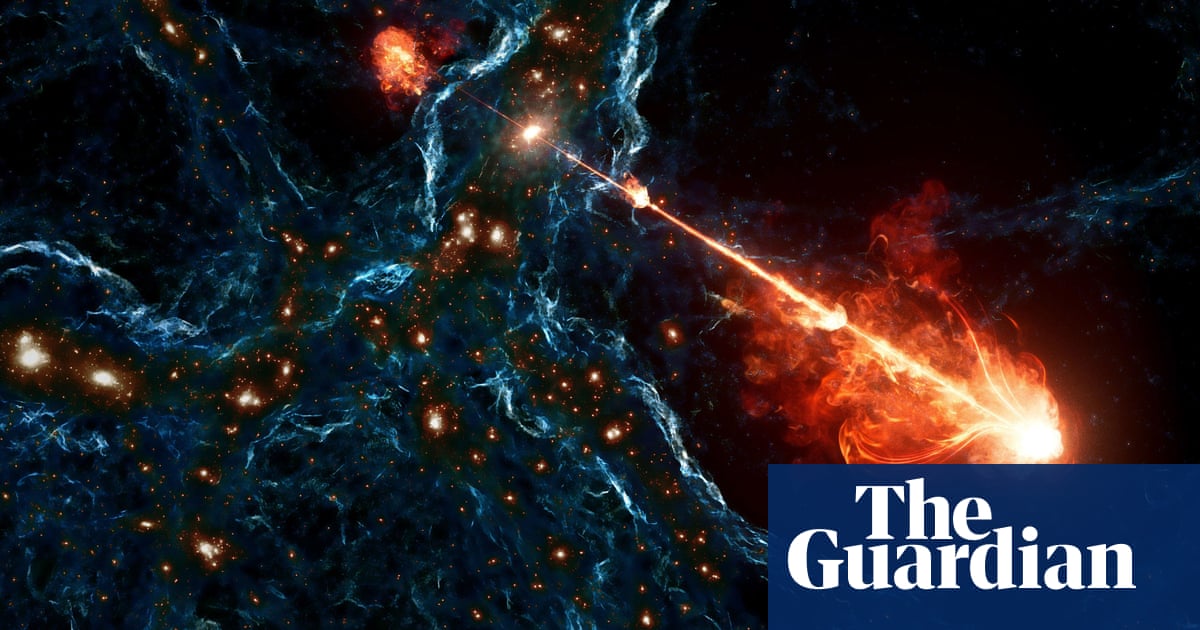
지구의 레이어 애니메이션.
케임브리지 대학이 주도한 새로운 연구는 지표 아래 약 3,000km 떨어진 지구 핵과의 경계층에 있는 특이한 암석 주머니에 대한 상세한 ‘이미지’를 최초로 획득했습니다.
하와이 제도의 거의 바로 아래에 위치한 신비한 암석 지역은 매우 낮은 속도의 여러 지역 중 하나입니다. 지진파가 통과하면서 속도가 느려지기 때문에 그렇게 불리는 것입니다.
2022년 5월 19일자 잡지에 게재된 연구 네이처 커뮤니케이션즈이 주머니 중 하나의 복잡한 내부 이방성을 처음으로 자세히 밝히고 지구의 깊이와 그 안에서 작동하는 과정을 조명합니다.
“지구의 모든 심오한 내적 특징 중에서 이것이 가장 훌륭하고 복잡합니다.” – 나처럼
“지구의 모든 깊은 내부 특징 중에서 이것은 가장 매력적이고 복잡합니다. 우리는 이제 내부 구조를 보여주는 최초의 확실한 증거를 얻었습니다. 이것은 깊은 지진학의 진정한 랜드마크입니다.”라고 주 저자인 박사 과정 학생인 Zhi Li가 말했습니다. 캠브리지 지구과학부에서. ground”.
지구의 내부는 양파처럼 형성되어 있습니다. 중심에는 철-니켈 핵이 있으며, 맨틀이라고 하는 두꺼운 층으로 둘러싸여 있으며 그 위에 얇은 외부 지각(우리가 살고 있는 지각)이 있습니다. 맨틀은 단단한 암석이지만 매우 천천히 흐를 정도로 뜨겁습니다. 내부 대류는 표면에 열을 공급하여 지각판의 움직임을 일으키고 화산 폭발에 연료를 공급합니다.
과학자들은 지진의 지진파를 사용하여 지구 표면 아래에 있는 것을 “보게” 합니다. 이러한 파도의 메아리와 그림자는 레이더와 같은 깊은 내부 이미지를 나타냅니다. 그러나 최근까지 우리 행성의 내부 열 흐름을 연구하는 데 주요 관심 영역인 코어-맨틀 경계에 있는 구조의 “이미지”는 입자가 거칠고 해석하기 어려웠습니다.

본 연구에 사용된 Sdiff 광선의 사건과 궤적. a) 1D PREM Earth 모델에 대해 96°, 100°, 110° 및 120°에서 Sdiff 파동에 대한 광선 궤적을 보여주는 하와이의 초저속 영역 중심을 절단하는 단면. 위에서 아래로 점선은 410km, 660km 및 2,791km(코어 맨틀 경계 위 100km)의 불연속성을 나타냅니다. b) 2791km 깊이에서 배경 단층 촬영 모델 SEMUCB_WM1의 이벤트 및 Sdiff 광선 궤적. 20100,320(노란색), 20111214(녹색), 20120417(빨간색), 20180910(보라색), 20180518(갈색), 20181030(분홍색), 20181030(분홍색), 221개 역 등 다양한 색상으로 칠해진 행사용 비치볼 , 및 광선. 이 연구에 사용된 하부 맨틀의 구멍 깊이 2791km에서 Sdiff 파동 궤적. 단기 분석에 사용된 이벤트는 노란색으로 강조 표시됩니다. 제안된 ULVZ 위치는 검은색 원으로 표시됩니다. 점선은 A에서 그린 단면을 보여줍니다. 크레딧: Nature Communications, DOI: 10.1038/s41467-022-30502-5
연구원들은 코어-맨틀 경계에서 킬로미터 규모의 구조를 탐지하기 위해 최첨단 수치 모델링 방법을 사용했습니다. 공동 저자인 Dr. Kuangdai Leng에 따르면[{” attribute=””>University of Oxford, “We are really pushing the limits of modern high-performance computing for elastodynamic simulations, taking advantage of wave symmetries unnoticed or unused before.” Leng, who is currently based at the Science and Technology Facilities Council, says that this means they can improve the resolution of the images by an order of magnitude compared to previous work.
The researchers observed a 40% reduction in the speed of seismic waves traveling at the base of the ultra-low velocity zone beneath Hawaii. This supports existing proposals that the zone contains much more iron than the surrounding rocks – meaning it is denser and more sluggish. “It’s possible that this iron-rich material is a remnant of ancient rocks from Earth’s early history or even that iron might be leaking from the core by an unknown means,” said project lead Dr Sanne Cottaar from Cambridge Earth Sciences.

Conceptual cartoons of the Hawaiian ultra-low velocity zone (ULVZ) structure. A) ULVZ on the core–mantle boundary at the base of the Hawaiian plume (height is not to scale). B) a zoom in of the modeled ULVZ structure, showing interpreted trapped postcursor waves (note that the waves analyzed have horizontal displacement). Credit: Nature Communications, DOI: 10.1038/s41467-022-30502-5
The research could also help scientists understand what sits beneath and gives rise to volcanic chains like the Hawaiian Islands. Scientists have started to notice a correlation between the location of the descriptively-named hotspot volcanoes, which include Hawaii and Iceland, and the ultra-low velocity zones at the base of the mantle. The origin of hotspot volcanoes has been debated, but the most popular theory suggests that plume-like structures bring hot mantle material all the way from the core-mantle boundary to the surface.
With images of the ultra-low velocity zone beneath Hawaii now in hand, the team can also gather rare physical evidence from what is likely the root of the plume feeding Hawaii. Their observation of dense, iron-rich rock beneath Hawaii would support surface observations. “Basalts erupting from Hawaii have anomalous isotope signatures which could either point to either an early-Earth origin or core leaking, it means some of this dense material piled up at the base must be dragged to the surface,” said Cottaar.
More of the core-mantle boundary now needs to be imaged to understand if all surface hotspots have a pocket of dense material at the base. Where and how the core-mantle boundary can be targeted does depend on where earthquakes occur, and where seismometers are installed to record the waves.
The team’s observations add to a growing body of evidence that Earth’s deep interior is just as variable as its surface. “These low-velocity zones are one of the most intricate features we see at extreme depths – if we expand our search, we are likely to see ever-increasing levels of complexity, both structural and chemical, at the core-mantle boundary,” said Li.
They now plan to apply their techniques to enhance the resolution of imaging of other pockets at the core-mantle boundary, as well as mapping new zones. Eventually, they hope to map the geological landscape across the core-mantle boundary and understand its relationship with the dynamics and evolutionary history of our planet.
Reference: “Kilometer-scale structure on the core–mantle boundary near Hawaii” by Zhi Li, Kuangdai Leng, Jennifer Jenkins and Sanne Cottaar, 19 May 2022, Nature Communications.
DOI: 10.1038/s41467-022-30502-5

“음악 팬. 매우 겸손한 탐험가. 분석가. 여행 괴짜. 익스트림 TV 전문가. 게이머.”



/cdn.vox-cdn.com/uploads/chorus_asset/file/25619621/247271_Spectacles_2024_NHernandez_Melo_0015.jpg)





